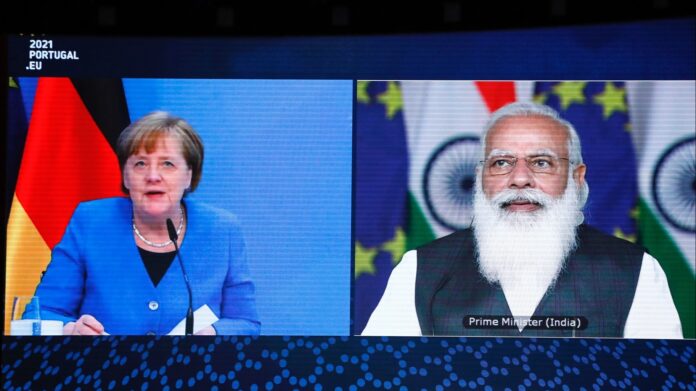DELHI: The European Union and India have agreed to resume stalled free trade negotiations and seek closer cooperation to combat climate change at a virtual summit, as concerns about China bring Brussels and New Delhi closer.
Partly overshadowed by the COVID-19 crisis in India, the meeting on Saturday brought together Indian Prime Minister Narendra Modi and all of the bloc’s 27 leaders for the first time in eight years in a sign of the EU’s renewed interest in the Indo-Pacific region.
Past EU-India summits have involved only the Indian prime minister and the EU’s chief executive and chairman.
“We agreed to resume negotiations for a … trade agreement which would respond to the current challenges,” EU and Indian leaders said in a statement after the talks, adding that for talks to succeed, both sides had to solve market access issues.
In parallel, EU and India will start talks on a separate investment protection deal and an accord on geographical indications – famous brand names often linked to the places they are made, from France’s champagne to India’s Darjeeling tea.
“Between the EU and India there is a close relationship but also a lot of untapped potential,” European Commission President Ursula von der Leyen said. “The most untapped potential is in trade and investment.”
China’s rise from a benign trading partner to a rival power with a growing military presence has alarmed the West and its allies in the Indo-Pacific, where Brussels wants more influence.
“We agreed that, as the world’s two largest democracies, the EU and India have a common interest in ensuring security, prosperity and sustainable development in a multi-polar world,” the joint statement said.
German Chancellor Angela Merkel welcomed the resumption of talks.
“The negotiations have also stalled many times and that is why I am so glad that they have now been resumed,” she said after an informal EU summit.
She said she expected work would move ahead at a “much faster pace”.
EU-India trade talks were frozen in 2013 over differences including tariff reductions, patent protection, data security and the right of Indian professionals to work in Europe.
Competition with China
The bloc’s leaders, at an EU summit in Porto in Portugal, faced pressure over the Modi government’s crackdown on dissent, with civil society groups including Amnesty International holding a candlelit vigil outside the summit venue.
Ahead of the talks, Amnesty International called on EU leaders to push Modi to “live up” to shared values.
“An intolerance of dissent has been a hallmark of Prime Minister Modi’s time in office,” Eve Geddie, the rights group’s EU office director said.
A 2020 study by the European Parliament put the benefits of a trade deal for the EU with India at up to 8.5 billion euros ($10.2bn), although the estimate was made before the United Kingdom’s departure from the bloc.
The EU and India also agreed to build joint infrastructure projects around the world, notably in Africa, to be described as a connectivity partnership.
The deal follows an accord between the EU and Japan in 2019, seeking an alternative to China’s vast Belt and Road Initiative (BRI) infrastructure strategy that raised suspicion in the West and Tokyo.
Both sides also pledged increased cooperation to limit climate change. The statement said the EU and India would hold meetings to collaborate in renewable energy, energy storage technology and modernising power grids.




